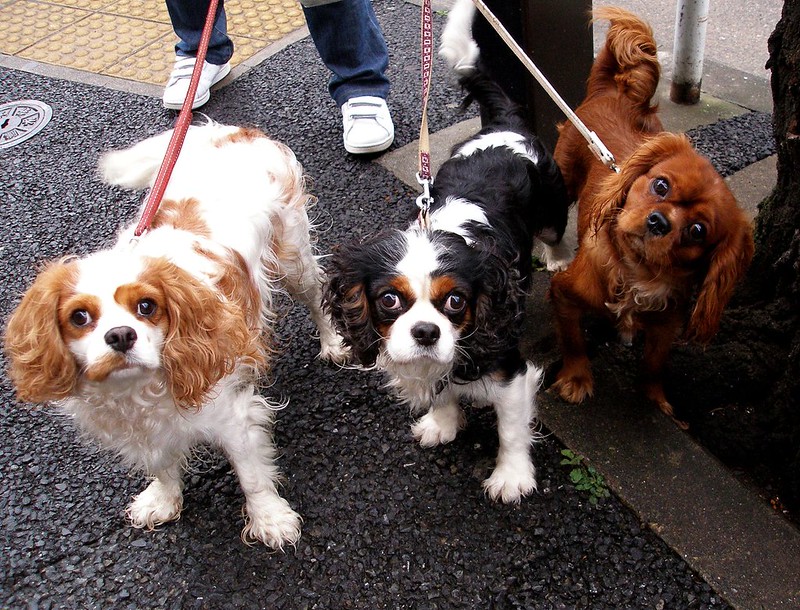Holidaying with dogs
A Dog’s Tale
Dogs. Big round slobbery ones or small, plucky courageous ones, whatever size or shape, dogs form an important part of many travellers’ experiences.
If you’ve ever read Henry Lawson’s ‘That There Dog o’ Mine,’ and smiled knowingly when Lawson’s old shearer describes his four-footed mate as being ‘a true, straight, honest, and faithful mate to me,” and adds in defiance, “I ain’t going to desert him now,” then like Lawson’s shearer, travelling with your furry mate means confronting your own worries and the hard reality that not everyone – caravan parks included – loves your dog.
So getting your faithful friend from here to there, finding the right place to camp and staying on the good side of the manager once you’re there, are key to many years of happy travelling with your dog.
Doggie Dos
Bewhiskered Vet Bob Doneley says there’s much more to travelling with dogs than loading the van with some doggie treats and pointing the car towards the highway.
Bob says the increasing numbers of travellers with dogs is easy to understand given the strong bonds that bind owners and their pets. “To many people the thought of leaving dogs in a boarding kennel is abhorrent,” he says. “They couldn’t think of being separated that long.”
Bob says travellers need to do a number of things before they head off. First, the caravanner should plan their route, making a list of the vets and their contact details in each town through which you’ll be passing. He suggests popping the vets contact details on something like an iPad so that you can quickly contact help in case of a canine emergency.
To be prepared for an emergency, Bob insists it’s worthwhile ringing ahead to talk to local vets about “the most common problems,” in their area. He says that way travellers will know whether they need to guard against heat exhaustion, tick paralysis, snake bite or something else. “For example in central Queensland you’re going to be thinking about heat exhaustion and snake bite but if you’re heading up the coastal highways you need to think about tick paralysis. You can prepare yourself for the more common problems your pet could face, the clinical signs and emergency first aid.”
Before you go, Bob encourages owners to get pet insurance. “If you are the other side of Cloncurry and faced with a hefty vet bill and you only have $50 in the pocket you are going to be in strife without insurance.”
Bob reckons, once you have secured pet-friendly parks then “if your dog is on special medications or diet then you need to take sufficient with you to last the entire trip.” He says this is important for dogs that might be diabetic, or have heart or skin conditions.
Next, pet owners should carry with them the contact details of their regular vet. “That means if they go to Whoop Whoop the local vet can call your vet at home and discuss the animal’s history. Well prepared travellers will go to their vet and get a printed medical record and keep that with the dog’s vaccination certificates,” Bob explained.
Knowing the previous medical history means the local vet is less likely to give inappropriate treatment.
When you are on the road, Bob says that carsickness could be a problem. According to Bob, dogs that are sick during travel do so because they are either anxious or legitimately travel sick. Anxious dogs, Bob says, need something to calm them while other dogs need something to control nausea. “You need to talk to your vet about the need for anti-anxiety medications. The general rule would be to use the sedative just long enough to give the dog the chance to accustom itself to travel. With time the need for such medications should reduce as the dog becomes accustomed to travel. It’s used as an aid to training, if you like.”
By way of training, Bob reckons owners do themselves a favour by spending time teaching the dog to accept a carry case or crate and to relax and be calm in it. 'That way, they can be safely and positively locked away so that you can go and do things that you’ve got to do when you're camping.'
Bob says, getting dogs used to crates takes several weeks of training before travelling.
I would recommend stopping every two to three hours - Bob Doneley
Once travelling, just as regular reviver stops are important to travellers they’re important to their pooches. Bob says that small dogs need exercise breaks when travelling more often than larger dogs although 'it depends on the temperament of the dog. I would recommend stopping every two to three hours. That gives the owners a chance to stretch their legs, take the dog for a bit of a walk and let it empty out, have a drink and maybe a meal depending on what its car sickness is like. And let him have a good sniff around. That leaves the animal and the driver more relaxed and refreshed.'
When travelling, Bob insists dogs should be restrained within the car either with a grill behind the back seat, a carry case or body harnesses.
Within the park, he advises owners to use a tie-up chain that allows the dog to exercise without wandering around the park. 'You have to remember the privacy of others so by tethering the dog to one of these it can move and be active.' Nonetheless, he says it’s important to walk your dog regularly.
Bob reminds us that it’s very important to remember to clean up after the dog. 'Have a good supply of plastic bags so you can pick up poo and you aren’t leaving a pile of poo in the park after you’ve departed.'
A quick guide to caravanning and camping with dogs
Before you go
- Ensure your pet is fully vaccinated and up-to-date with its registration.
- Make sure your pet has a name tag and contact phone number on its collar
Pet friendly parks all have different conditions for allowing pets, so make sure you confirm with management the caravan / holiday park’s pet policy when you enquire.
- Check what pet friendly public parks and beaches are close by your final destination.
- Ensure you have the proper equipment to transport your pet.
- Take a ‘pooper scooper’ or plastic bags to keep parklands clean.
- Take a coat or blanket for your pet.
On the road
Keep your pet on their regular pet food – it’s no time for a change of diet.
Make sure you take your pet’s favourite part of home such as a blanket or a toy.
Bring grooming equipment such as dog shampoo - you don't want a smelly pooch.
Remember your can opener for food.
Make sure you take munchies and treats for your pet
During your stay

Image by
Respect the caravan holiday park’s regulations and other campers and caravanners.
Don’t allow your pet to dominate the space.
Other travellers may not find your pooch or parrot as good company as you do
Always pick up any dog dropping.Make sure you have complete control over your pet always
Sick Puppy
 You know what it’s like, you’re away on holidays and you get sick. It happens to the best of us. However, it’s perhaps worse when it’s your best mate that’s sick, especially when our best mate is our dog or cat. Here’s what you can do when your furry, four-footed mate is under the weather while you’re travelling.
You know what it’s like, you’re away on holidays and you get sick. It happens to the best of us. However, it’s perhaps worse when it’s your best mate that’s sick, especially when our best mate is our dog or cat. Here’s what you can do when your furry, four-footed mate is under the weather while you’re travelling.
To combat motion sickness, try this: -
Help your dog face forward while traveling by strapping him or her into the seat with a specially designed canine seatbelt.
Lower car windows a little to equalize the inside and outside air pressures.
Keep the vehicle cool.
Limit your dog’s food and water consumption before travel.
Give your pet a treat or two every time he or she gets into the car.
Give your dog a toy that he or she enjoys and can have only in the car.
Serious Illness
In case of serious illness its essential to accompany your pet to a local Vet with your Pet’s records and a detailed note of your dog’s symptoms.
In Case of Injury
To help in event of an injury, consider a pet first aid kit that should include basic items like bandages, gauze and tape as well tweezers to remove splinters and a muzzle to keep your dog from biting, antiseptic wipes, saline solution and disposable gloves.

A dog's tale